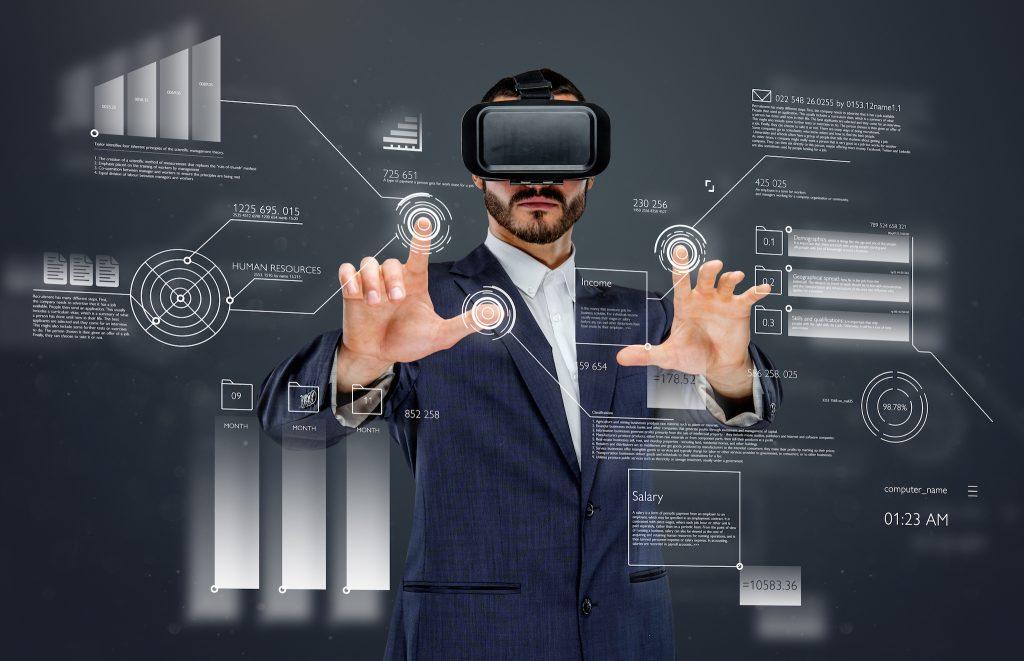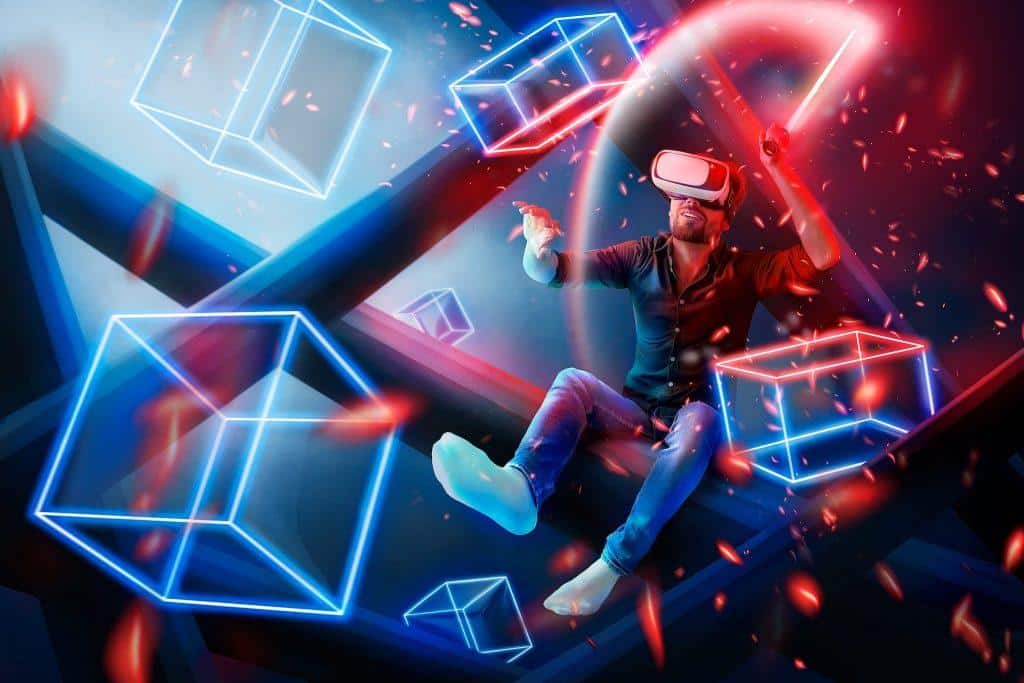Pioneering Metaverse Business Models: Unlocking Opportunities in the Virtual World
As the metaverse continues to evolve and expand, new and innovative business models are emerging that capitalize on its limitless potential. In this article, we delve into the top 25 metaverse business models that are shaping the landscape in 2023 and beyond.
Harnessing the Metaverse: Opportunities for Businesses and Marketing Professionals
The metaverse is revolutionizing the way businesses engage with their target audience and generate sales, while simultaneously opening doors for marketing professionals to establish themselves as experts in this emerging field. In this section, we explore the potential of the metaverse as a powerful communication platform and the opportunities it presents for businesses and marketing professionals alike.
Defining Metaverse Business Models and Their Distinction from Traditional Digital Business Models
A metaverse business model refers to the unique approach companies adopt to generate value and revenue within the immersive and interconnected virtual world of the metaverse. It encompasses various aspects such as product development, user engagement, monetization strategies, and the overall experience within this digital realm.
What sets metaverse business models apart from traditional digital business models lies in the immersive, interactive, and persistent nature of the metaverse itself. Unlike conventional digital models, metaverse business models leverage the following distinctive characteristics:
- Spatial Presence: The metaverse offers a sense of spatial presence that allows users to explore and interact with their surroundings in a more realistic and engaging manner. This creates opportunities for businesses to develop virtual environments, products, and experiences that captivate their audience in ways previously unattainable through traditional digital channels.
- Real-time Interaction: The metaverse enables real-time interaction between users, as well as between users and virtual objects or environments. This facilitates dynamic and collaborative experiences, opening doors for innovative business models that capitalize on the power of social connections and user-generated content.
- Digital-Physical Convergence: The metaverse blurs the line between digital and physical realities, creating a seamless connection between online and offline experiences. This convergence allows businesses to develop products and services that exist in both realms, extending their reach and potential revenue streams.
- Personalization and Customization: The metaverse empowers users to personalize and customize their experiences, avatars, and environments. This presents businesses with the opportunity to cater to individual preferences and offer tailored solutions, resulting in enhanced customer satisfaction and loyalty.
- Emerging Technologies: The metaverse is fueled by cutting-edge technologies such as virtual reality, augmented reality, blockchain, and artificial intelligence. By embracing these technologies, businesses can create innovative solutions and drive growth in the rapidly evolving metaverse landscape.
Embracing the Metaverse: A Golden Opportunity for Businesses to Thrive
The metaverse presents a wealth of opportunities for businesses to tap into new markets, generate revenue, and establish a strong presence in the digital world. With the rise of non-fungible tokens (NFTs), virtual goods, and innovative technologies, the metaverse is driving the creation of new business models and transforming existing industries.
- New Business Opportunities: The metaverse enables companies to explore and develop new business models that capitalize on its unique attributes. NFTs, virtual goods, and digital assets can be leveraged to create innovative products and services that capture the imagination of users and generate revenue.
- NFTs and Virtual Goods: Non-fungible tokens (NFTs) and virtual goods are becoming increasingly popular within the metaverse. Businesses can sell virtual goods, such as digital art, virtual real estate, and in-game items, which can be represented as NFTs to ensure their uniqueness and authenticity. These digital assets can be traded and sold, creating new revenue streams for businesses in the metaverse.
- Digital-Physical Integration: The metaverse bridges the gap between the digital and physical worlds, allowing businesses to extend their reach beyond traditional boundaries. For instance, a physical store can sell virtual goods or offer meta experiences that complement their existing products and services, fostering customer engagement and brand loyalty.
- New Business Models: The metaverse is paving the way for innovative business models that challenge the status quo. Metaverse companies can explore novel approaches to monetization, such as token-based economies, subscription services, and in-world advertising, enabling them to adapt and grow within this rapidly evolving landscape.
- Metaverse Service Providers: As businesses enter the metaverse, there is a growing demand for metaverse service providers that offer a range of solutions, from virtual environment development and customization to user experience design and integration services. This creates opportunities for companies to specialize in these areas and establish themselves as leaders in the metaverse ecosystem.
Immersive Experiences: The Key to Success for Metaverse Business Models
The success of business models in the metaverse is closely tied to the immersive experiences they provide for customers. By leveraging the unique attributes of the metaverse, companies can create captivating, engaging, and memorable interactions that resonate with their audience and drive growth.
- Virtual Land and Metaverse Real Estate: The metaverse is a virtual world composed of interconnected spaces that can be owned, developed, and monetized. Virtual land and metaverse real estate present opportunities for businesses to create and manage immersive environments that cater to the needs and preferences of their customers. This business model for virtual land allows companies to generate revenue through the sale or lease of space in the metaverse, as well as through advertising, events, and partnerships.
- Content Creators and 3D Virtual Experiences: The metaverse offers a powerful platform for content creators to develop new immersive experiences that captivate users and enhance their engagement. From virtual art galleries and concerts to interactive educational content and gaming experiences, businesses can leverage the metaverse to deliver a wide range of services in this virtual landscape.
- VR Headsets and Immersive Technologies: The adoption of VR headsets and other immersive technologies has significantly contributed to the growth of the metaverse, enabling users to experience the virtual world in a more realistic and engaging manner. Businesses that use the metaverse to offer innovative services and experiences can benefit from the widespread adoption of these technologies, capturing the interest and imagination of users across the globe.
- Starting a Metaverse Service: Companies looking to start out a metaverse service should prioritize creating immersive and interactive experiences that resonate with their target audience. By offering unique, personalized, and engaging services in the metaverse, businesses can differentiate themselves from competitors and build lasting relationships with their customers.
1. Virtual Real Estate Development and Management
As digital environments become more immersive, virtual real estate has emerged as a thriving business model. Developers acquire land within popular metaverse platforms, design and construct virtual properties, and lease or sell them to users or businesses. Property management services also ensure the smooth running of these virtual spaces.
2. Digital Fashion and Wearables
Digital fashion is revolutionizing the way people express themselves within the metaverse. Brands are creating virtual clothing and accessories, enabling users to showcase their unique styles in digital environments. This business model capitalizes on the demand for exclusivity and customization, driving significant revenue streams.
3. Virtual Events and Conferences
The metaverse has opened up new possibilities for hosting virtual events and conferences. Companies can create immersive experiences that engage attendees in ways that traditional events cannot. From virtual trade shows to music festivals, this business model offers numerous opportunities for growth and innovation.
4. In-World Advertising and Sponsorship
As users spend increasing amounts of time in virtual worlds, in-world advertising and sponsorship have emerged as lucrative business models. Companies can place ads within popular metaverse platforms or sponsor virtual events, reaching highly engaged audiences and fostering brand awareness.
5. Metaverse-as-a-Service (MaaS) Platforms
Metaverse-as-a-Service (MaaS) platforms allow businesses to create and manage their own virtual worlds. This business model involves providing the infrastructure, tools, and support required for companies to build and maintain their presence in the metaverse, opening up new revenue streams and partnership opportunities.
6. Decentralized Finance (DeFi) and Tokenization
Decentralized finance and tokenization are transforming the way value is exchanged within the metaverse. This business model leverages blockchain technology to create new financial products and services, such as digital currencies, virtual banks, and decentralized lending platforms.
7. Skill and Talent Marketplaces
As the demand for metaverse-related skills grows, so does the need for specialized talent. Marketplaces that connect skilled professionals with companies seeking their expertise are on the rise. This business model capitalizes on the growing demand for digital artists, developers, and other metaverse professionals.
8. Virtual Tourism and Experiences
Virtual tourism enables users to explore new destinations and experiences without leaving their homes. Companies can create realistic, immersive environments that transport users to far-off locations, offering unique and engaging experiences that cater to a wide range of interests.
9. Education and Training in the Metaverse
Education and training within the metaverse present unique opportunities for businesses to create immersive learning environments. By utilizing virtual classrooms, simulations, and other interactive tools, companies can offer high-quality, engaging educational experiences that cater to a global audience.
10. Content Creation and Distribution
Content creation and distribution within the metaverse offer endless opportunities for businesses to captivate audiences. From virtual reality films to interactive games, companies can create and distribute a wide range of content that engages users and drives revenue.
11. Virtual Healthcare Services
The metaverse is revolutionizing the healthcare industry by providing virtual healthcare services. Telemedicine, remote consultations, and mental health support can be delivered seamlessly through virtual clinics and therapy centers. This business model enables healthcare providers to reach a broader patient base while offering personalized and efficient care.
12. eSports and Competitive Gaming
eSports and competitive gaming are thriving within the metaverse. Businesses can organize virtual tournaments, facilitate team formations, and provide a platform for gamers to showcase their skills. This business model generates revenue through ticket sales, advertising, and sponsorship deals.
13. Virtual Social Spaces
Virtual social spaces are redefining the way we interact and build relationships within the metaverse. Businesses can develop and maintain digital environments designed for socializing, offering users a sense of community and belonging. These spaces can be monetized through membership fees, in-app purchases, and advertising.
14. Augmented Reality (AR) Integration
Augmented reality integration is blurring the lines between the physical and digital worlds. Businesses can leverage AR technology to enhance real-world experiences, such as retail shopping or navigating urban environments. This business model creates new opportunities for revenue generation, customer engagement, and innovation.
15. Intellectual Property (IP) Licensing
The metaverse offers a unique platform for businesses to license their intellectual property. Companies can create virtual merchandise, experiences, or environments based on popular franchises, generating revenue through licensing fees and royalties. This business model allows businesses to monetize their IP in creative and engaging ways.
16. Data Analytics and User Behavior Insights
Data analytics and user behavior insights within the metaverse enable businesses to better understand their audience and optimize their offerings. By collecting and analyzing data on user preferences, activities, and engagement patterns, companies can tailor their products and services to better serve their customers. This business model relies on the value of data-driven decision-making and targeted marketing efforts.
17. Virtual Job Fairs and Networking Events
The metaverse provides a platform for virtual job fairs and networking events, connecting job seekers with potential employers in an immersive environment. Businesses can host these events to showcase their company culture, job openings, and facilitate meaningful connections. This model generates revenue through event ticket sales, sponsorship, and employer participation fees.
18. Virtual Museums and Art Galleries
Virtual museums and art galleries bring cultural experiences into the digital realm, allowing users to explore and appreciate art from around the world. Businesses can create and curate digital exhibitions, generating revenue through admission fees, donations, and merchandise sales. This model democratizes access to art and fosters global appreciation for cultural heritage.
19. Avatar Customization and Personalization
Avatar customization and personalization are essential aspects of the metaverse, enabling users to express their identity and individuality. Businesses can offer a wide range of avatar customization options, such as unique skins, hairstyles, and accessories. This business model capitalizes on the demand for self-expression and generates revenue through in-app purchases and premium services.
20. Virtual Fitness and Wellness
Virtual fitness and wellness services are transforming the way we maintain our health and well-being within the metaverse. Companies can offer virtual workout classes, guided meditation sessions, and personalized wellness programs, engaging users in immersive experiences that promote healthy lifestyles. This business model generates revenue through subscription fees, class registration fees, and advertising partnerships.
21. Virtual Co-working Spaces
Virtual co-working spaces offer a flexible and collaborative environment for remote workers, freelancers, and entrepreneurs within the metaverse. Businesses can develop and manage digital workspaces that provide a range of amenities, such as meeting rooms, private offices, and networking events. This business model generates revenue through membership fees, event ticket sales, and advertising partnerships.
22. Metaverse Integration Services
As more businesses enter the metaverse, there is a growing demand for metaverse integration services. Companies can offer solutions that help businesses seamlessly transition and establish a presence in the virtual world, such as custom virtual environments, e-commerce platforms, and user experience design. This business model generates revenue through consulting fees, implementation fees, and ongoing support services.
23. Virtual Reality (VR) Therapy
Virtual reality therapy is an innovative application of the metaverse in the mental health sector. Businesses can offer immersive therapeutic experiences that help individuals cope with anxiety, depression, and trauma, as well as improve overall mental well-being. This business model generates revenue through service fees, insurance reimbursements, and partnerships with healthcare providers.
24. Virtual Assistants and AI-driven Services
Virtual assistants and AI-driven services are becoming an integral part of the metaverse ecosystem. Companies can develop intelligent AI-powered solutions that offer personalized assistance, automate mundane tasks, and enhance user experiences within the virtual world. This business model generates revenue through subscription fees, in-app purchases, and licensing agreements.
25. Collaborative Design and Prototyping
The metaverse offers a powerful platform for collaborative design and prototyping across various industries, such as architecture, automotive, and fashion. Businesses can provide immersive design tools and environments that facilitate remote collaboration, reduce development time, and streamline the prototyping process. This business model generates revenue through subscription fees, software licensing, and premium support services.
As the metaverse evolves and matures, the range of business opportunities within this digital landscape will continue to expand. These innovative business models represent a glimpse into the future, where creativity, collaboration, and technology merge to create unprecedented experiences and redefine the way we live, work, and interact. By embracing the metaverse’s potential and staying agile in the face of change, businesses can seize new opportunities, drive growth, and emerge as leaders in this brave new world.
FAQs
What are some of the top metaverse business models discussed in this article?
This article covers a wide range of metaverse business models, including virtual real estate development and management, digital fashion and wearables, virtual events and conferences, in-world advertising and sponsorship, and metaverse-as-a-service platforms, among others.
How does the metaverse provide opportunities for businesses to engage with their target audience?
The metaverse allows businesses to create immersive experiences, such as virtual events, interactive content, and personalized experiences that foster deep engagement with their target audience. This can lead to increased brand awareness, loyalty, and ultimately, sales.
What are the benefits of virtual co-working spaces within the metaverse?
Virtual co-working spaces offer a flexible and collaborative environment for remote workers, freelancers, and entrepreneurs. These digital workspaces provide a range of amenities, such as meeting rooms, private offices, and networking events, facilitating productivity and innovation in a virtual setting.
How do virtual assistants and AI-driven services fit into the metaverse ecosystem?
Virtual assistants and AI-driven services are becoming an integral part of the metaverse ecosystem by providing personalized assistance, automating mundane tasks, and enhancing user experiences. These intelligent AI-powered solutions can generate revenue through subscription fees, in-app purchases, and licensing agreements.
What opportunities does the metaverse present for marketing professionals?
The metaverse presents marketing professionals with the opportunity to specialize in this emerging field, developing expertise in areas such as in-world advertising, virtual event planning, and digital content creation. By becoming well-versed in metaverse marketing strategies, professionals can position themselves as leaders and innovators in this growing industry.






Pingback: The Metaverse and the immersive experience - Metaverse Canvas